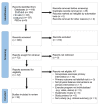The Effect of Individualized Fall Prevention Programs on Community-Dwelling Older Adults: A Scoping Review
- PMID: 35510013
- PMCID: PMC9060767
- DOI: 10.7759/cureus.23713
The Effect of Individualized Fall Prevention Programs on Community-Dwelling Older Adults: A Scoping Review
Abstract
An alarming rate of injurious falls among older adults warrants proactive measures to reduce falls and fall risk. The purpose of this article was to examine and synthesize the literature as it relates to programmatic components and clinical outcomes of individualized fall prevention programs on community-dwelling older adults. A literature search of four databases was performed using search strategies and terms unique to each database. Title, abstract, and full article reviews were performed to assure inclusion and exclusion criteria were met. Data were analyzed for type of study, program providers, interventions and strategies used to deliver the program, assessments used, and statistically significant outcomes. Queries resulted in 410 articles and 32 met all inclusion criteria (19 controlled trials and 13 quasi-experimental). Physical therapists were part of the provider team in 23 (72%) studies and the only provider in 10 (31%). There was substantial heterogeneity in procedures and outcome measures. Most common procedures were balance assessments (n=30), individualized balance exercises (n=29), cognition (n=21), home and vision assessments (n=16), specific educational modules (n=15), referrals to other providers/community programs (n=8), and motivational interviewing (n=7). Frequency of falls improved for eight of 13 (61.5%) controlled trials and four of five (80%) quasi-experimental studies. Balance and function improved in six of 11 (54.5%) controlled trials and in each of the six (100%) quasi-experimental studies. Strength improved in three of seven (43%) controlled trials and four of five (75%) quasi-experimental studies. While many programs improved falls and balance of older adults, there was no conclusive evidence as to which assessments and interventions were optimal to deliver as individualized fall prevention programming. The skill of a physical therapist and measures of fall frequency, balance, and function were common among the majority of studies reviewed. Despite the variability among programs, there is emerging evidence that individualized, multimodal fall prevention programs may improve fall risk of community-dwelling older adults and convenient access to these programs should be emphasized.
Keywords: community-dwelling; comprehensive geriatric assessment; exercise; falls; geriatrics; independent living; older adult; physical therapy; prevention; rehabilitation.
Copyright © 2022, Boright et al.
Conflict of interest statement
The authors have declared financial relationships, which are detailed in the next section.
Figures
Similar articles
-
Prevention of falls and fall-related injuries in community-dwelling seniors: an evidence-based analysis.Ont Health Technol Assess Ser. 2008;8(2):1-78. Epub 2008 Oct 1. Ont Health Technol Assess Ser. 2008. PMID: 23074507 Free PMC article.
-
Determining Whether a Dosage-Specific and Individualized Home Exercise Program With Consults Reduces Fall Risk and Falls in Community-Dwelling Older Adults With Difficulty Walking: A Randomized Control Trial.J Geriatr Phys Ther. 2018 Jul/Sep;41(3):161-172. doi: 10.1519/JPT.0000000000000114. J Geriatr Phys Ther. 2018. PMID: 27893567 Clinical Trial.
-
Effects of a multifactorial fall prevention program on fall incidence and physical function in community-dwelling older adults with risk of falls.Arch Phys Med Rehabil. 2013 Apr;94(4):606-15, 615.e1. doi: 10.1016/j.apmr.2012.11.037. Epub 2012 Dec 6. Arch Phys Med Rehabil. 2013. PMID: 23220343 Clinical Trial.
-
A review of the impact of exercise on fall rates among community-dwelling older adults.J Am Assoc Nurse Pract. 2021 Jul 5;34(2):247-251. doi: 10.1097/JXX.0000000000000636. J Am Assoc Nurse Pract. 2021. PMID: 34231546 Review.
-
Population-based interventions for preventing falls and fall-related injuries in older people.Cochrane Database Syst Rev. 2024 Jan 5;1(1):CD013789. doi: 10.1002/14651858.CD013789.pub2. Cochrane Database Syst Rev. 2024. PMID: 38180112 Free PMC article.
Cited by
-
Student-Led Falls Prevention Program for Community-Dwelling Older Adults in a Rural Community: A Pilot Study.Aust J Rural Health. 2025 Feb;33(1):e13221. doi: 10.1111/ajr.13221. Aust J Rural Health. 2025. PMID: 39781589 Free PMC article.
-
Administrative Analysis of the Home-Based Older Persons Upstreaming Prevention Physical Therapy Program: A Pilot Observational Study.Cureus. 2024 Aug 20;16(8):e67290. doi: 10.7759/cureus.67290. eCollection 2024 Aug. Cureus. 2024. PMID: 39310421 Free PMC article.
-
Eight-year longitudinal falls trajectories and associations with modifiable risk factors: evidence from The Irish Longitudinal Study on Ageing (TILDA).Age Ageing. 2023 Mar 1;52(3):afad037. doi: 10.1093/ageing/afad037. Age Ageing. 2023. PMID: 36995137 Free PMC article.
-
Exploring Population Characteristics and Recruitment Challenges in Older People Experiencing Falls at Home without Hospitalization or with an Emergency Department Visit: Insights from the RISING-DOM Experience.Clin Interv Aging. 2023 Dec 1;18:1995-2008. doi: 10.2147/CIA.S421053. eCollection 2023. Clin Interv Aging. 2023. PMID: 38058551 Free PMC article. Clinical Trial.
References
-
- Falls. [ Feb; 2021 ];https://www.who.int/news-room/fact-sheets/detail/falls 2021 6:2021.
-
- The effectiveness of a community-based program for reducing the incidence of falls in the elderly: a randomized trial. Clemson L, Cumming RG, Kendig H, Swann M, Heard R, Taylor K. J Am Geriatr Soc. 2004;52:1487–1494. - PubMed
-
- The avoidance of activities due to fear of falling contributes to sedentary behavior among community-dwelling older adults with chronic musculoskeletal pain: a multisite observational study. Stubbs B, Patchay S, Soundy A, Schofield P. Pain Med. 2014;15:1861–1871. - PubMed
-
- Older adults with fear of falling show deficits in motor imagery of gait. Sakurai R, Fujiwara Y, Yasunaga M, Suzuki H, Sakuma N, Imanaka K, Montero-Odasso M. J Nutr Health Aging. 2017;21:721–726. - PubMed
-
- WISQARS™ - Web-based injury statistics query and reporting system. [ Mar; 2022 ];https://www.cdc.gov/injury/wisqars Published. 2020
Publication types
LinkOut - more resources
Full Text Sources
Miscellaneous

